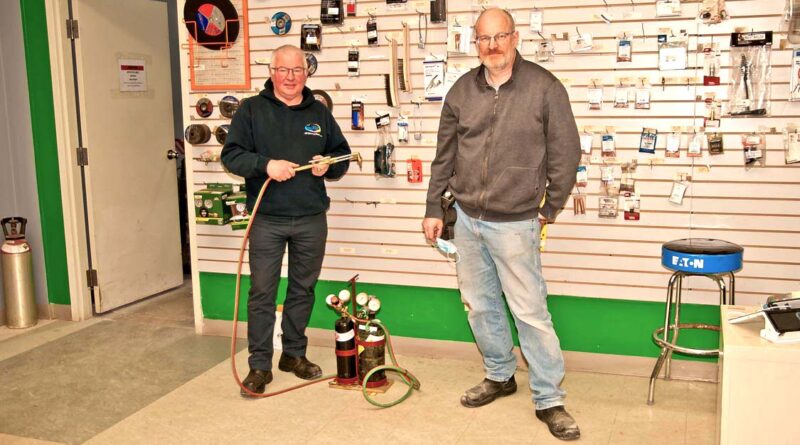Being Wired And Other Things
By John Swartz
Digital technology has changed so many things in our lives, even the things we don’t notice, until we run up against them. Using electricity is one of them. Sure, we all know about refrigerators and toasters that connect to the internet, but what your household or workplace electrical system?
It’s not a case of running cable throughout a structure, wiring up some receptacles and plugging in anymore. These days, and more so tomorrow, it’s all about powering and controlling the things plugged into the outlets automatically or remotely for better efficiency. For most people who have modernized two things drive their decision – using less power to save money on bills, and to conserve energy production for environment saving purposes.
“If you are conscious of your long-term energy consumption costs I think we can really help you. Nothing is a short term payback, we’ll work out what we think will give you your best (value),” said Tony Telford, president of Orser Technical Services.
One of the important parts of controlling electricity use is knowing when and how much you are using.
“Anything with a light on it, or its warm to the touch if it’s off, that’s energy being wasted. Then you put on air conditioning in the summer to help cool your house. There’s the equivalent of one generating station of what they call phantom power,” said Telford. One of the products Orser has is a box made by Wiser Energy Systems which connects between the incoming supply from the outside (which is usually the grid, but as we’ll see, may be from elsewhere) and the electrical panel where all the wires distributing power to various parts of your house or business come together.
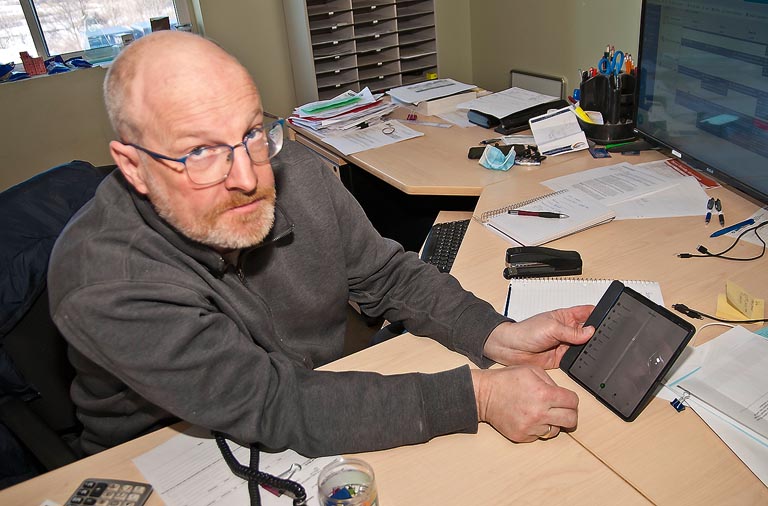
Wiser Energy Monitoring Systems Mobile App
“After a learning process it will actually tell you what devices are turning on and off, show you how much energy you are using on a minute by minute basis. If you are trying to be greener, trying to save on your energy, after a period of time it actually learns what you are using. You can see trends on what your usage is. If you are trying to monitor what your actual energy bills are, you can program in the time of use charges,” said Steven Donoghue, the electrical supervisor at Orser. “It helps to teach people what you are actually doing and what you can do to save money,”
This is good for knowing when things that work automatically are turning on; things that might be better running at other, cheaper times of the day. You may also find out how many things are on that night not have be, or are on for too long.
“The thing that tends to get bad is phone chargers. On mine (household power consumption) I have about 230 watts of energy which is always on, Rogers boxes, Bell boxes, phone chargers, TV, DVD players, those are the sort of things are always on and you don’t always realize this is costing me money,” said Donoghue. “It all adds up over a period of a year. For me, over the course of a year, mine is roughly $260 over year for phantom power. A lot of that is also having two teenagers in the house and people really don’t pay attention to turning the light off when you don’t need it on,” said Donoghue.
Donoghue has a Wiser app he can use on his computer or on his phone that reports everything going on electrically in his home. Remote control is also handy. And Orser has done homes where everything can be controlled on premises from a panel, off premises from a phone, or simply by voice.
“You do have to be careful. You’ve got to walk into it with your eyes open. I remember seeing an article about a family and they made everything in their house internet connected. Their actual door locks were accessible by Alexa and that’s hackable. You have to be security conscious. It’s a really great way of moving forward, but you have to get used to it like using your credit card with pin numbers and phishing emails, you’ve got to think about your own security,” said Donoghue.
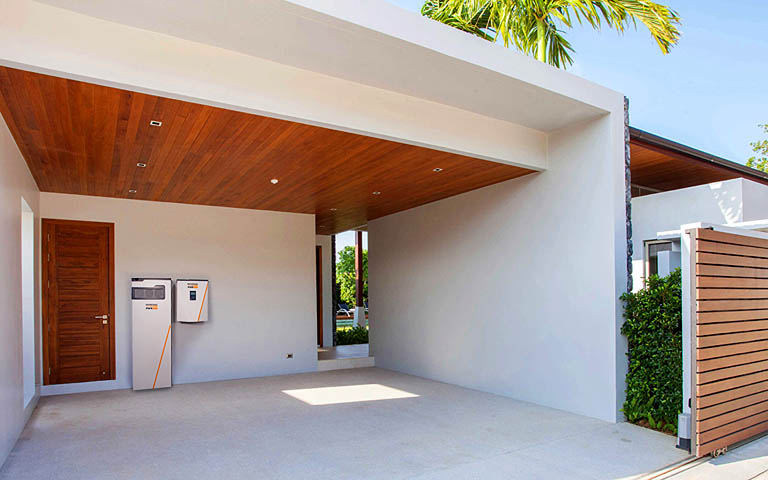
Another way to reduce use of electricity from the grid is to replace it with solar panels, or displace you use charges with a battery system – both of which Orser installs. The brand they use is Generac and the battery system comes in 6” x 18” cabinets.
“If you don’t have enough sun you can you use your solar to charge them up, or you can power off the grid at night at your low value (cost), charge your batteries up and take that charge and disperse it during the day during your peak power costs,” said Telford. The system is smart enough to know when to pull power from the grid (if that is how it’s connected) and when and how much electricity to put into the household distribution system.
“It’s on demand, time of use and cost. I’d like to say we are the experts at that, but Generac has a nice algorithm that does that for you. It senses and responds to those sensory inputs. It’s pretty new. It’s pretty expensive, but I think this is the market for it so we invested some time, money and training so we could be on the cutting edge.”
“It attracts people who like new gadgets. It attracts people who in their mind and their beliefs it is greener. Down the road battery storage will be the key to alternative energy. Generac is trying to be on the leading edge and we want to follow them,” said Telford. And, batteries are great for when the power goes out, however another thing really big with people is backup generators, also made by Generac. Orser installed 100 of them in 2021.
“After that big storm we had (mid December), normally we get probably maybe ten calls every couple of weeks; I had 202 in two weeks because people were out for 4 days,” said Donoghue. That long? Most people recall power being out a good chunk of the day, but not days.
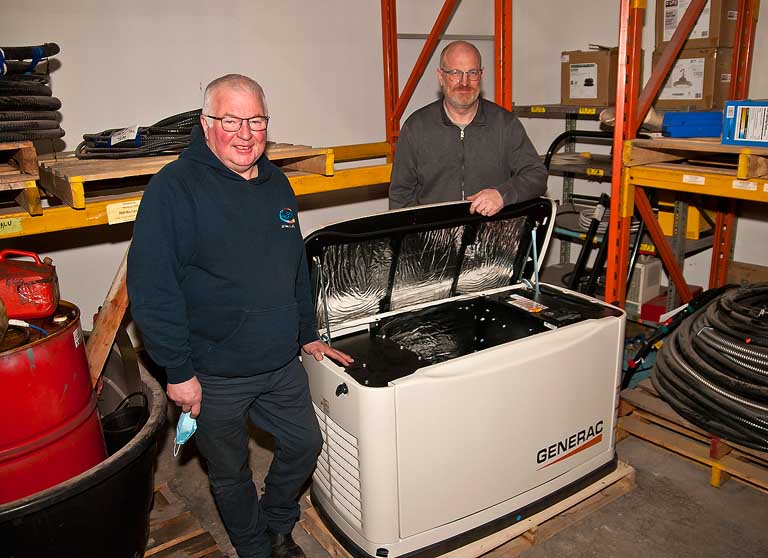
“Down on Bay Street, they were three days,” without power said Telford. “The City of Orillia, historically has a very good adaptability network. They can shut off problem areas, turn others on and basically encircle the problem. Orillia Power has traditionally done a really good job. The power reliability is pretty good, it’s pretty hard to sell to somebody in town with the war cry, “you’re going to need it,”” said Telford.
‘It doesn’t seem to be too much rhyme or reason. Certain neighbourhoods, like Severn, they’re out virtually all the time, every couple weeks their power goes out,” said Donoghue.
Diversifying
Orser Technical Services has changed with the times. Many people still think of it as Orser Electrical. The company has been in business since. 1934 and was reorganized in 1995.
“About 2 years later we went through some epiphanies and self analysis and said, ‘Ok, electric is too restricting (so we became) Orser Technical because we do much more than just wire houses,” said Telford. He has been with Orser for 45 years, starting right out of high school.
“Orser is historically – and today – electrical contractors, focusing not on cookie cutter homes, (but) on people and customers who are invested in their building and their time making it their home – customs, a lot of renovation. And Steve is excellent, if you want to build a smart house, he’s got you down pat. We (also) service industry in Orillia, what’s left, there’s not a factory I haven’t been into.”
It doesn’t end there. They are also very big with controls. Anything you can control electrically, from machinery, manufacturing processes, to lighting they do. They also install electric motors and repair them too, and they have a lock on one area Orillia businesses rely on.
“We are the largest local supply of welding gasses in the area; we’re looking at expanding that business. If you need beer gas, acetylene, oxygen, welding gasses, consumables, we’re the depot, the only place in Orillia and that’s been a growing business for the last 25 years. Anything to fo with welding, we’ll sell it,” said Telford. “(When) British Oxygen Company closed their branch in Forest Home and ask Orser if they would be their agent depot. We saw it as an opportunity to bring in a completely new client base that traditionally may not come to Orser’s, and it proved to be fruitful and correct. It’s been good for our business and it expanded our customer base.”
That doesn’t seem like they are into enough things. Maybe there’’s something else they do.
“We service and sell virtually every kind of water pump you can think of, sumps, deep well, circulating, process pumps, industrial, sewage, it covers the gamut – cooling tower pumps,” Telford said.
Designing
No two houses are the same, and no two homes run the same way. Everyone has different needs and ideas of what they’d like to do. Telford and Donoghue say its best to come to them with blue prints and spend some time discussing what you want to do. Anyone who has built a house, or worked at building knows the best time to wire anything is before the walls get closed in. If you want to be free of the grid, there’s some wiring to do now. If you want your house to respond to your every verbal whim, but need time to afford it, put the wiring in now. Planning on buying an eclectic car in 5 years? Put the wiring for the charging station in now.
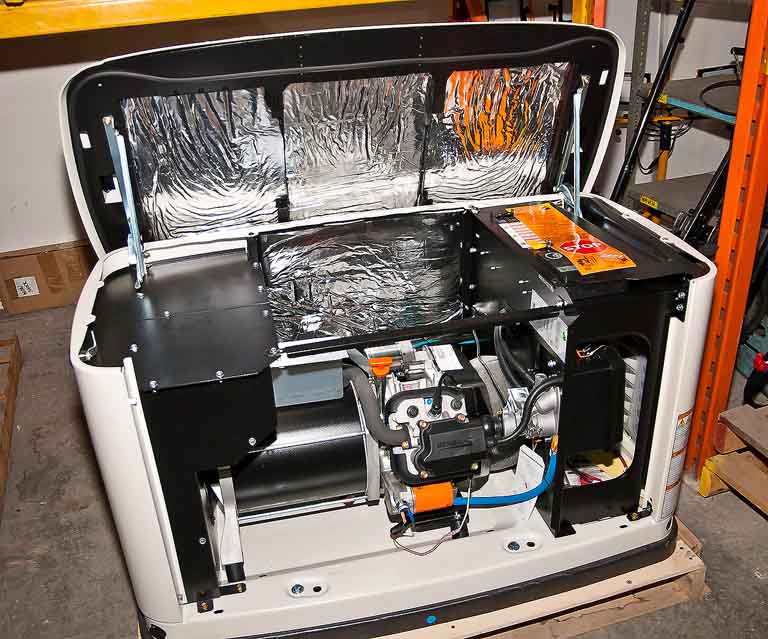
“The very first thing we would recommend is you put a transfer switch in, even if you don’t have the generator yet; put it in (while) under construction because the cost to put that in is under $2,000, versus afterwards it could be 4 or 5. It makes your house more saleable. If you’re thinking about it (other types of controls), we’ve got some rough in ideas that you could add onto later,” said Telford. Cost is always a consideration, and both Telford and Donoghue say the best time to start planning is now.
“It can be quite difficult to put a cost implication to it without having a discussion first; what are your ideas, what are you trying to achieve? If you say, in 10 years, 20 years I don’t want to be on hydro, that’s one conversation. I just want to reduce my bills, that’s a different conversation,” said Donoghue. “We can help them have that conversation and when they’re designing it that is the time to have that conversation, whether they actually go ahead with the recommendations we are suggesting is a completely different issue.”
That also goes for commercial and industrial cases too. Though Telford says many of the design considerations for chain stores, branch plants and start ups are done by engineers; Orser steps in to source components and install.
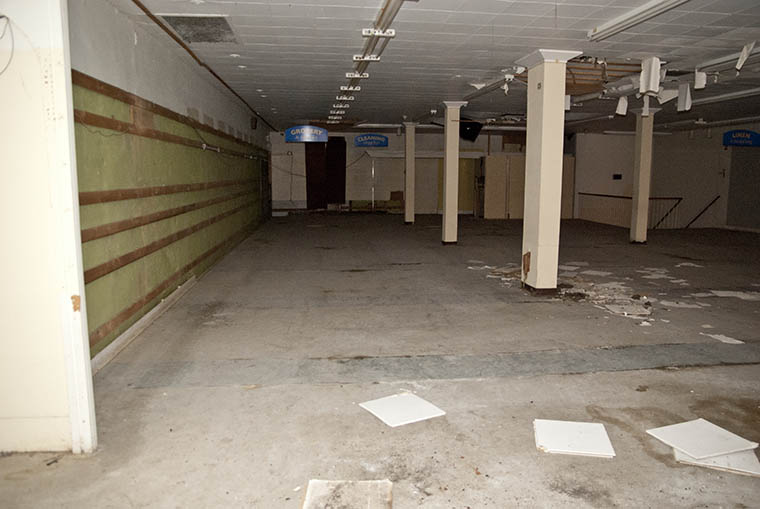
“Creative Nomad is an example. The owner hired a mechanical/electrical engineer who designed the building,” said Telford. The engineer used all the applicable codes to make sure the needs were satisfied. “We come in and we install what they recommend. Sometimes we might even come up with a different idea that will satisfy the code and maybe reduce costs or give her some flexibility, and that’s’ a pretty good example of what we did at that job.”
Lighting is still big consideration for many businesses. Telford said LED lighting has been around long enough new improved systems are available for upgrades.
“We’ll have an agent who does nothing but lighting, and he’ll have a detailed package we can present to you the owner. We try to make it as painless as possible,” said Telford.
Staffing Challenges
Telford employs 12 people. Some of them are experts in automation, some in power systems, some with motors and etc., but they will work together on big jobs and to help each other solve design issues which cross silos.
“It is a challenge. We are such a multi-faceted company that specializing in one thing is very difficult. Today you might call and expect a transformer repair. Tomorrow it’s a transfer switch and a generator. The next day it’s a drive for a frequency drive system that doesn’t react to all the inputs and the process control,” said Telford.
Most of the staff are qualified electricians and have to be certified to be able to do even the specialized work, but the days of just being an just an electrician are changing. Backgrounds in automation, generators, alternative power systems, motors, pumps are necessary.
“There’s a certain class of electricians who don’t want to be bothered with that at all. They just want to pull wires in a house. Firms like Orser, good or bad, we challenge ourselves. We have to find people who are skilled in those (other) fields, or we have to do the training for it,” said Telford.
It’s difficult to find new staff when there are openings. Right now he wants to hire someone for automation control system repairs and installations.
“We’re looking for a person who is keen on industrial controls, motor controls, process systems,” said Telford, and example would be people, “interested in wiring up breweries and building the control systems for all the automation,” said Telford.
The generator part of the business also needs an installer, repair and maintenance person.
“We service over 500 standby generators in the area. You have to go out once a year, do an inspection, oil changes, do a complete tune up; there will be fault finding. It requires a mechanical aptitude and (you should) like small engines,” Telford said.
Because of the changes on the other side of the wire connection finding people who are more than electricians is tough.
“It’s outstripping the availability of those to install and service,” said Telford. Having special certifications are always going to get attention, but not having any doesn’t mean anyone is out of luck working at Orser.
‘Not always. It’s more a personality type. You don’t necessarily have to know, no one knows everything; you just have to be willing to learn what you don’t know. Some people aren’t willing and don’t want to know, and there’s other people it makes their day to learn something,” said Donoghue.
“Typically it’s a person who has a little geeky side to them, there’s no problem looking at a manual and actually reading a manual,” said Telford.
It appears Orser Technical Services, Telford and Donoghue are well positioned with service and products for a greener, new world steamrollering toward us, even if the employee talent pool needs to catch up.
(Photos by Swartz – SUNonline/Orillia and Supplied) Main: Tony Telford and Steven Donoghue of Orser Technical Services.

